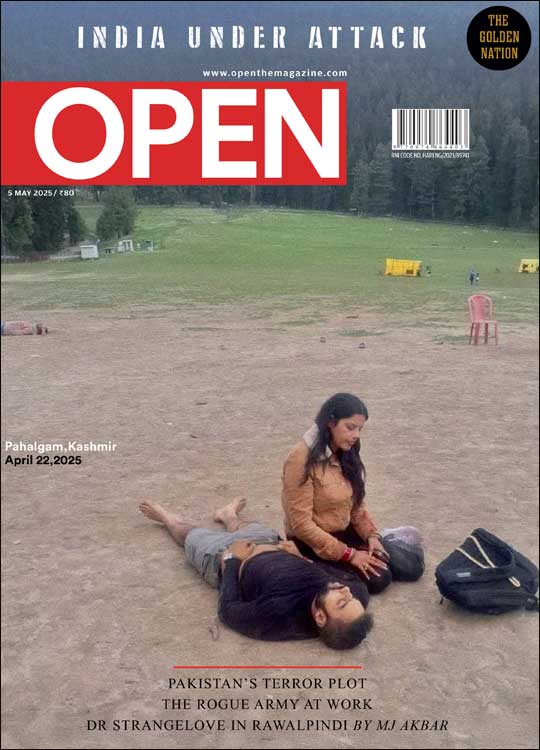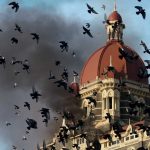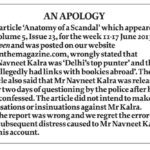Didi is singing alone this time
As Mamata Banerjee rides a wave of triumphalism, Sohini Chattopadhyay in West Bengal says all is not as funny as the Trinamool leader’s limericks
 Sohini Chattopadhyay
Sohini Chattopadhyay
 Sohini Chattopadhyay
|
24 Apr, 2014
Sohini Chattopadhyay
|
24 Apr, 2014
/wp-content/uploads/2015/11/mamata-tigress1.jpg)
As Mamata Banerjee rides a wave of triumphalism, Sohini Chattopadhyay in West Bengal says all is not as funny as the Trinamool leader’s limericks
Trinamool Congress chairperson and Bengal Chief Minister Mamata Banerjee is a painter, and a poet, essayist and writer with 45 books to her authorship. Her preferred form on the political platform, however, is the limerick, the chhora as it is called in Bangla. She has, as it happens, also authored two books of rhyme for children. “BJP aashbe naa//CPM jaagbe naa//Congress aar naa/aar naa,” she says, seemingly spontaneously, pacing up and down a stage set up on the grounds of a college in Domkal on a dehydrating April afternoon. A rough translation would go thus:
Won’t let the BJP in the door / We’ll let the CPM snore / The Congress, no more / No more
Unlike a classic limerick, the fourth line is not smooth rhyme but a repetition of uneven rhythm. But she breaks it up and times it sharp, working the rough- hewn texture of the limerick to her advantage. It seems more spontaneous, less structured, more real. Like Didi herself, who is wont to unpredictable outbursts of unparliamentary behaviour. In 2005, she flung some papers at the Deputy Speaker of the Lok Sabha, Charanjit Singh Atwal, because Lok Sabha Speaker Somnath Chatterjee had disallowed an adjournment motion requested by her. In 1997, she had hurled her shawl at the then Railway Minister Ram Vilas Paswan for ignoring Bengal in his rail budget.
Some days ago, she said, referring to Narendra Modi, “Namo Namo hoye, naa No-no hoye ota” (Will people say NaMo NaMo, or No-No to him). It was a remark that got considerable play on air. It’s the same style of uneven limerick, and sounds trite when you read it, but watch it on YouTube. Banerjee delivers it with a rhythm and furrowed-brow conviction that makes it hard not to listen and laugh along, perhaps even cheer along. If she were to listen to the ‘elite classes’ she dismisses, they would tell her this is performance poetry. But perhaps she knows this already; perhaps she prefers to call it a form of jatra, the folk theatre of melodramatic texture so popular in the rural areas of Bengal. The general understanding is that her own appeal is far higher in rural areas than it is in the urban and suburban parts of Bengal.
I turn to smile in shared enjoyment of the ‘chhora’ with my neighbours, but they are all staring transfixed at the stage, standing on their toes atop the red plastic chairs arranged for a public meeting in Domkal in Murshidabad constituency. Murshidabad is among the six Lok Sabha constituencies in West Bengal that go to the polls on 24 April, the second phase of voting in the state. Banerjee has been campaigning on the trot for the past six days; she has put together an ambitious timetable to cover all 42 constituencies in the state as well as 65 in the neighbouring states of Assam, Tripura, Jharkhand and others where her Trinamool Congress party has put up candidates. At 59, she is known to maintain a punishing work schedule that is said to keep her bureaucrats on their toes. Sukumar Mahato, a local reporter with The Times of India, says she is the first Chief Minister who undertakes regular monthly recces of assorted districts accompanied with her team of bureaucrats from Writers’ Buildings. “She has an unconventional style, she will stop to eat papad with children in a village and ask what they need. Then she will go the district magistrate to ask what scheme could furnish the funds for whatever this is. Have you heard of such a Chief Minister in Bengal earlier?” he asks.
This is the first time that Banerjee’s party is contesting elections on its own in West Bengal; in the previous Lok Sabha polls, the Trinamool Congress had an alliance with the Congress, and in 2004, with the BJP. For a personality- centred party like the Trinamool, Didi’s presence on the campaign trail is possibly vital.
This is Banerjee’s third rally of the day in the Murshidabad area, a Sunday, and people have been gathering at the grounds from 2 pm, an hour before schedule. There are ice-cream vending carts, hawkers selling wax-sealed packets of salted nuts, popcorn and chanachur (a savoury mixture beloved to Bengalis), vendors frying shiny brown telebhaja (pakoras) on the edges of the ground, and a smart man selling slivers of watermelon on a blistering afternoon. Domkal is mostly an agricultural village, and most people here have come after winding up their day’s work a little early, carrying bottles of water to survive the heat. This could well be a carnival ground. The mood is relaxed. It is as if people are on a Sunday outing.
Shahbul Hoque, his lungi folded up to his knees, can’t stop grinning, probably in anticipation of the performance lined up ahead. He has come on foot from Raghunathpur, a village about 5 km away from Domkal, and waded through the river Seyalmari to listen to Didi. This is the first time he will see her live, but he likes watching her on television. His life has changed considerably since Didi came to power in the state in 2011, ending 34 years of Left Front rule. “I got a house to live in, I got a BPL card,” he says, flashing his brown-stained toothy grin even wider. Hoque is a daily wage agricultural labourer. He received an allowance of Rs 40,000 to build a pucca house, and his application for a BPL card, which he had submitted several times earlier, was processed quickly. He also got work under the MGNREGA scheme, and though he is yet to be paid for it, he says he’s certain the money will come to him eventually. Hoque is unlettered and unsure of how old he is, but his son is a graduate of a local college and runs a small business selling pens, and his daughter is in high school. Hoque says he voted for Didi to be Chief Minister (the Vidhan Sabha election was in 2011), and for her party in the Panchayat polls of 2013. But he used to be a Congress supporter. “Now we are all for Didi, my family. She cares for us,” he says.
Though there is still an hour to go before Banerjee’s slated arrival, Trinamool’s Murshidabad candidate Mohammad Ali and some party office bearers have decided that the visibly swelling crowd needs to be managed from stage. The ground capacity is over 100,000, but the party expected a turnout of around 20,000, Ali says over a hurried lunch in a college room before the meeting. In the event, the meeting saw several thousands more attending; the district intelligence bureau of the police say more than 60,000 attended, while Ali, an unassuming man who rates himself third in the electoral race, puts the number at 80,000. The previous day, Rahul Gandhi’s rally in neighbouring Behrampore was attended by less than 10,000 people, and was generally seen as a flop. Interestingly, Murshidabad, which has a majority Muslim population, is an area where the Trinamool is considered weak. In the three Lok Sabha seats of Murshidabad district, the Trinamool has not won a single seat so far.
Rehana Bibi is sitting with her daughter Saheba in the women’s enclosure, and chatting with her neighbours, unaffected by the heat and deafening announcements. She chuckles when she hears I have come from Kolkata to listen to Didi. “Me too,” she says, “I have come from here (pointing her thumb backward to indicate the village) but I have brought my daughters and son along. They wanted to watch TV but I told them this would be better,” she says. “I know, she dragged me,” says Saheba, with such a happy grin that it belies any reluctance to attend. This will be her first election as a voter and she is undecided about her vote. But Rehana is confident that all the four votes in their household (her younger daughter does not have a card yet) will go to Didi. They are a farming family and Rehana does some tailoring on the side. “She (implying Saheba) got her cycle from school because of Didi. Soon, she will get Rs 25,000 from the school, and the girls are getting scholarship money too. The children appreciate all this,” she says. Under the West Bengal government’s Kanyashree scheme launched in 2013, girls in the age group of 13-18 years get an annual scholarship of Rs 500. And girls who continue to remain enrolled in education at 18, and are unmarried, get a lumpsum payment of Rs 25,000. The scheme is meant to discourage child marriage and promote women’s education. “My husband has always been a Congress supporter, I used to vote for them too. But this time, he too is voting for Didi. We are getting some support from her,” she says.
When Banerjee steps out of her helicopter, she is accompanied by two actors, the sisters Riya and Raima Sen, but the meeting is her show throughout. She speaks for almost 45 minutes straight, seemingly spontaneously, walking around on stage briskly and directing frequent impromptu remarks at the crowd. A band of boys has climbed atop the makeshift structures supporting the public announcement systems, and Mohammad Ali and other party office- bearers have been screaming at them to climb down. They are still there when Banerjee is on stage, but she adopts a completely different tack: “Lakkhi chhele amar (good boys of mine), come down now. Come down slowly from the right,” she coos. It is hard not to be amused by such remarks, or to dislike her bustling energy on stage. She speaks briskly, in contrast to the contemplative style favoured by better-known political orators like Narendra Modi, and in everyday homespun lingo, making for an entertaining performance.
“Her political discourse is utterly homegrown, crowded with idioms used only with those one is very familiar with, her conspiracy theories verge on neighbourhood gossip, her humour is that of an indulgent matriarch, and her display of affection and anger completely uncensored by the public gaze,” says Sumana Roy, a writer based in Siliguri. “Our women politicians speak—or at least try to speak—an utterly urban patriarchal discourse, one that kills ‘women’s speech’. I think of Mamata Banerjee as a significant game-changer in the way the political discourse in the country has been forced to become elastic.”
Filing out of the rally grounds, Rabi-ul- Islam, 28, has decided that Didi will get his vote. “It’s not that Mannan-da has not worked,” he says, referring to Abdul Mannan Hossain, the Congress MP from Murshidabad for the past two terms, “But I like Didi’s energy and initiative. She has said there will be a super-speciality hospital in the constituency, and I think she will manage it.” He is a grameen doctor with a dispensary in Domkal, and not a direct beneficiary of any of the state government’s schemes. His friend Foizul Shah, who is receiving an unemployment allowance of Rs 1,500 a month from the state government’s Yubashree scheme, is even more enthusiastic: “Didi should be prime minister, byas (that’s it).”
In the high-ceilinged, old-Calcutta style office of the BJP’s Bengal unit, Pratap Banerjee, state vice-president of the party, is overseeing preparations for a press conference but is gracious with unexpected visitors. “This morning, two local clubs came to the office and asked to be given work for the election. Usually, they expect to be paid for their work with a carom board or a table-tennis board, but they just want to work for the election. I am now used to people dropping by without notice in the office. In the past five-six months, the membership of the party in Bengal has grown by five lakh. This is the Narendra Modi effect,” he says.
The BJP is fighting on its own this time, contesting all 42 seats. This is, in fact, the first time in several elections that the state is witnessing a four-corner contest among the Left, Trinamool, Congress and the BJP. Banerjee says the BJP is expecting to win between three and five seats this time, up from the sole seat the party won in 2009 (Darjeeling, with Jaswant Singh its victor). “What’s especially bracing is that I see BJP flags in the Muslim localities like Rajabazaar in Kolkata. I hear from district party workers that Muslims are coming to them, and saying that they have seen how well Muslims are doing in Gujarat. Many jewellery artisans from Bengal work in Surat. They have seen for themselves,” he says. The BJP’s vote percentage in 2009 was 6.5 per cent, according to Banerjee, and the party sees it shooting up to 22-25 per cent this time.
The Congress is rather subdued about its poll prospects in the state. “Our primary objective is to retain the six seats we have,” says Adhir Choudhury, state Congress president, over the phone. The Congress bastion is the Muslim-majority districts of Malda and Murshidabad, where the party won four of its six seats. “The second is to increase the tally by a couple of seats.” Local Bangla-language reporters are of the view that the Congress would do well to win four seats.
“The Left is continuing to show signs of decline,” says Ashis Chakrabarty, senior editor, The Telegraph, “Which is not surprising because the conditions in which the Left rose to power no longer exist today. Having said that, the Left polled 38 per cent [of all votes] in the heavily- rigged Panchayat election in 2013, where they were not allowed to contest many seats, so you can’t dismiss them entirely. I think it likely that the Trinamool will do better than they did in 2009 when they fought in alliance with others. If they were the third-largest party with 19 seats, they could emerge as the third-largest party this time too. But I feel Mamata is past her peak, which was 2011. Urban and suburban disaffection with her is growing. She might manage Kolkata this time, it’s only two seats after all, but Kolkata North will be a tough fight,” he says.
“I’d be very surprised if the Trinamool Congress emerged as the third largest party on 16 May. If they do, it will make them insufferable here,” says writer and filmmaker Ruchir Joshi, who wrote the book Poriborton: An Election Diary on the watershed 2011 Assembly polls in Bengal.
On 12 April 2012, Banerjee’s government arrested a professor of Jadavpur University, Ambikesh Mahapatra, for circulating a cartoon about her and her party colleague Mukul Roy. Mahapatra’s neighbour was arrested because the professor used his email address to send out the cartoon. Earlier that year, the West Bengal government grossly mishandled the rape complaint filed by Suzette Jordan in what has come to be known as the ‘Park Street rape case’. Aside from Banerjee calling the rape a “sajano ghotona (fabricated incident)” and transferring the police officer who cracked the case, her party’s MP Kakoli Ghosh Dastidar made the distasteful remark, “That was not at all a rape case. It was a misunderstanding between the two parties involved, between a lady and her client.” No action was taken against Ghosh Dastidar.
In 2011, when Banerjee came to power in the state, she enjoyed the support of several prominent Bengali artists and intellectuals, apart from the media. But that relationship with opinion-shapers never recovered after April 2012; many of these intellectuals have distanced themselves from Banerjee since. In August that year, she branded a farmer ‘a Maoist’ at a rally in Belpahari for shouting to her that she was making false promises, and had the police pick him up. In 2013 came the news of the Saradha ponzi scheme, estimated to have caused small investors in eastern India losses of several thousand crores. Members of Banerjee’s government were alleged to have close links with the scheme’s operators, and its refusal to let the CBI probe the scandal after it was exposed has been roundly criticised.
“I had written to the Chief Minister and warned her about the Saradha group of companies, Rose Valley and KD Singh’s Alchemist Group in 2012,” says retired IPS office Najrul Islam, who was once one of Banerjee’s handpicked officers. “Did she do anything about it?” Islam is one of the few in West Bengal who is openly critical of the Chief Minister, having written three books that frown on her ‘unconventional’ ways. “Unconventional is one thing, but do you have to work in illegal ways? Mamata Banerjee has charge of eight or ten of the most crucial ministries in the state. If anything, work culture in Writers’ Buildings has become even worse.”
On the pages of Kolkata’s English and Bangla language newspapers, and panel discussions on news television, criticism of the Trinamool government is constant and stinging. “There is a witticism in Calcutta about this,” says Trinamool Vice-president Derek O’Brien when I bring this up. “That there are two chief ministers in Bengal. One who has been elected, and one who is an unelected media tycoon.”
“Some 200 or 300 articulate [members of the elite] do not reflect urban disaffection. You will get the answer to your question on 16 May. If we win Kolkata, that will speak for itself, won’t it?”
Still, I ask of the Park Street rape case, about whether the party in retrospect feels its handling of the case cost it a lot of goodwill. “Even if I were to concede that to you at this moment, what would you say if we won the Kolkata South constituency?” says O’Brien.
Even as O’Brien says this, he speaks politely, warmly at times. The Trinamool office is a friendly place. They order ‘cha’ and ‘biskoot’ for visiting reporters, and field questions affectionately if slightly dismissively. Like the local ‘dada’, they are warm and like to humour you. To an extent, this is sweet. What’s not is the party’s refusal to express regret or introspect, and its belief that electoral triumph will absolve it of everything.

/wp-content/uploads/2025/04/ToC-Cover-Pahalgam.jpg)











More Columns
Centre warns media against TRP-driven coverage that endangers troops Open
Stitched in Silence: India’s Secret in Every Luxury Closet Immpana Srri
Was Shakespeare an Errant Husband? Nandini Nair